新概念英语2课文解析
新概念英语第二册:第38课课文详解及语法解析

【导语】新概念英语⽂章短⼩精悍,语句幽默诙谐,语法全⾯系统。
适合各个阶层的⼈群学习参考。
相信有了新概念英语,你也可以成为“⼤神”级别的⼈物!还在等什么?快来加⼊学习吧!⼩编与您⼀起学习进步! 课⽂详注 Further notes on the text 1.He had often dreamed of retiring in England and had planned to settle down in the country.过去他常幻想退休后到英国,并计划在乡间安顿下来。
(1)dream of 在这⾥不表⽰具体的做梦,⽽是“幻想”、“向往”的意思: Frank used to dream of having a car of his own. 弗兰克过去常幻想拥有⼀辆⾃⼰的车。
(2)settle down 是个固定短语,可以表⽰“定居”、“安⾝”、“安顿”等含义: They settled down in Australia in 1988. 他们1988年在澳⼤利亚定居了。
After two years of travelling, I want to settle down now. 旅⾏了两年之后,我现在想过安定的⽇⼦了。
2.Almost immediately he began to complain about the weather, for eventhough it was still summer, it rained continually and it was often bitterly cold. 但紧接着他就开始抱怨那⾥的天⽓了。
因为即使那时仍为夏季,但⾬总是下个不停,⽽且常常冷得厉害。
(1)for 在这⾥为连词, 为所陈述的事说出原因。
它与 because不同,不能⽤于句⾸。
并且在for后⾯必须重复主语: I don't have a car, for I can't afford it. 我没有车,因为我买不起。
新概念英语第二册第12课课文详解及语法解析

【导语】学习英语并不难啊。
你还在为英语成绩低拖后腿⽽烦恼吗?不要着急,⼩编为⼤家提供了新概念英语第⼆册第12课课⽂详解及语法解析。
相信加⼊学习当中的你,很快便不再受英语的困扰!还在等什么?和⼩编⼀起来学习吧! 课⽂详注 Further notes on the text 1.Our neighbour, Captain Charles Alison, will sail from Portsmouth tomorrow. 我们的邻居查尔斯·艾利森船长明天就要从朴次茅斯启航了。
(1)这个句⼦以及本课的⼤部分句⼦⽤的是⼀般将来时(cf. 本课语法) (2)句⼦的主语部分our neighbour 和Captain Charles Alison为同位语。
(cf. 第4课语法)下⽂ He will be in his small boat,Topsail 中的Topsail 也为同位语。
2.We'll meet him at the harbour early in the morning. 明天⼀⼤早我们将在码头为他送⾏。
在表⽰时间的短语 in the morning, in the afternoon等前⾯可以再加上early, late等副词,以便更确切地表⽰时间: Tony will arrive late in the afternoon. 托尼下午晚些时候才能抵达。
3.Topsail is a famous little boat. “涛波赛”号是艘有名的⼩艇。
little除了表⽰形体上⼩的意义之外,还含有“可爱”的意思,是个带有感*彩的词。
如little Tom(⼩汤姆)就有⼀种亲昵的味道。
4.It has sailed across the Atlantic many times. 它已经多次横渡⼤西洋。
across 是对某个细长物“横切”、“横断”、“横渡”等,尤指河流、马路等等。
新概念英语第二册lesson43课文
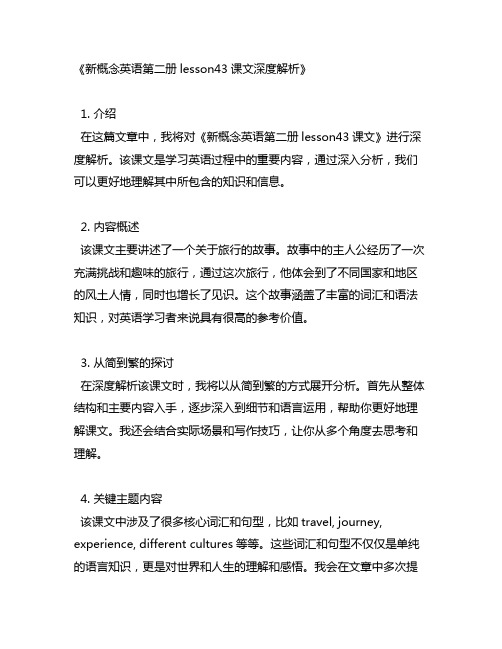
《新概念英语第二册lesson43课文深度解析》1. 介绍在这篇文章中,我将对《新概念英语第二册lesson43课文》进行深度解析。
该课文是学习英语过程中的重要内容,通过深入分析,我们可以更好地理解其中所包含的知识和信息。
2. 内容概述该课文主要讲述了一个关于旅行的故事。
故事中的主人公经历了一次充满挑战和趣味的旅行,通过这次旅行,他体会到了不同国家和地区的风土人情,同时也增长了见识。
这个故事涵盖了丰富的词汇和语法知识,对英语学习者来说具有很高的参考价值。
3. 从简到繁的探讨在深度解析该课文时,我将以从简到繁的方式展开分析。
首先从整体结构和主要内容入手,逐步深入到细节和语言运用,帮助你更好地理解课文。
我还会结合实际场景和写作技巧,让你从多个角度去思考和理解。
4. 关键主题内容该课文中涉及了很多核心词汇和句型,比如travel, journey, experience, different cultures等等。
这些词汇和句型不仅仅是单纯的语言知识,更是对世界和人生的理解和感悟。
我会在文章中多次提及这些关键主题内容,帮助你更加深入地理解它们的内涵和用法。
5. 总结与回顾在文章的结尾部分,我会对整篇课文进行总结与回顾。
我会从词汇、语法、情感等多个方面出发,对你进行全面、深刻和灵活的理解辅助。
通过这样的总结与回顾,相信你会对该课文有一个更加清晰和透彻的认识。
6. 个人观点与理解我会共享一些我个人对该课文的观点和理解。
我会结合自己的学习经验和英语学习方法,给出一些建议和建议。
希望这些可以为你在学习英语的道路上提供一些启发和帮助。
结语通过这篇文章的深度解析,相信你对《新概念英语第二册lesson43课文》会有一个更加深入和全面的了解。
在接下来的学习中,希望你可以更加注重实际运用和多角度思考,这样才能真正领略到英语学习的乐趣和意义。
在深度解析《新概念英语第二册lesson43课文》时,首先我们可以从整体结构和主要内容入手。
新概念英语第二册课文及翻译
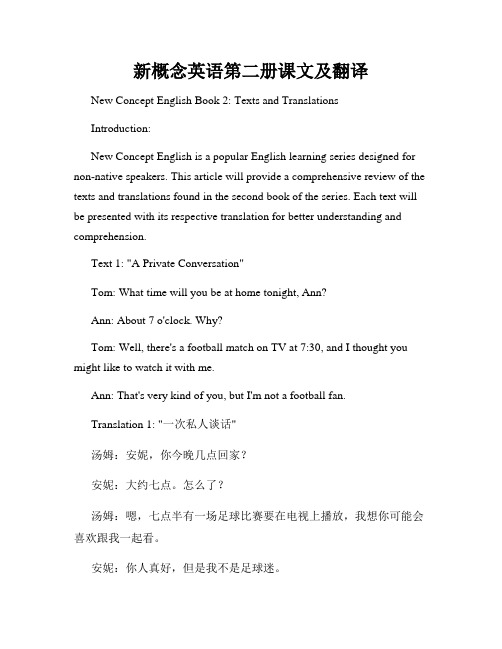
新概念英语第二册课文及翻译New Concept English Book 2: Texts and TranslationsIntroduction:New Concept English is a popular English learning series designed for non-native speakers. This article will provide a comprehensive review of the texts and translations found in the second book of the series. Each text will be presented with its respective translation for better understanding and comprehension.Text 1: "A Private Conversation"Tom: What time will you be at home tonight, Ann?Ann: About 7 o'clock. Why?Tom: Well, there's a football match on TV at 7:30, and I thought you might like to watch it with me.Ann: That's very kind of you, but I'm not a football fan.Translation 1: "一次私人谈话"汤姆:安妮,你今晚几点回家?安妮:大约七点。
怎么了?汤姆:嗯,七点半有一场足球比赛要在电视上播放,我想你可能会喜欢跟我一起看。
安妮:你人真好,但是我不是足球迷。
Text 2: "Flying Cats"There is a zoo in the United States with a most unusual exhibit. It is not a lion, tiger or elephant. These are all very normal in a zoo. But at this zoo, there are elephants that fly through the air. At first, visitors refuse to believe it. 'You are joking!' they say. But it is true. The elephants fly gracefully through the air. This is how they do it: the zookeepers stand them on a high wall. One says 'Flying elephants - fly!' and immediately they all jump off.For a few seconds, they fall like stones. Then suddenly, they spread out their huge ears, which are big enough to hold a plane, and they fly slowly and gracefully through the air.Translation 2: "飞翔的大象"美国有一家动物园,展出的动物非常不寻常。
新概念英语第二册:第2课课文详解及语法解析

【导语】学习新概念英语并不难啊。
你还在为英语成绩低拖后腿⽽烦恼吗?不要着急,⽆忧考⼩编为⼤家提供了“新概念英语第⼆册:第2课课⽂详解及语法解析”。
相信加⼊学习当中的你,很快便不再受英语的困扰!还在等什么?和⼩编⼀起来学习吧! 课⽂详注 Further notes on the text 1.It was Sunday. 那是个星期天。
在句⼦中,我们常常⽤it指时间、天⽓、温度或距离。
这种it有时被称为“虚主语” (empty subject),因为它没有实际意义。
它之所以存在,是因为英语句⼦必须包含主语和谓语。
请注意以下例句: 表⽰时间: It is 8 o'clock. 8点了。
表⽰天⽓: It's raining again. ⼜下⾬了。
It is cold. 天⽓冷。
表⽰环境: It was dark outside. 外⾯⼀⽚漆⿊。
作为第3⼈称单数的中性代词,it可以指⼀件东西、⼀个事件或者⽤来指是什么⼈: It was my aunt Lucy. 是我姑母露西。
(打来电话者) It is a lovely baby. 真是个可爱的⼩宝宝。
2.on Sundays 在星期天的时侯 (1)复数形式指每个星期⽇,或⼤部分星期⽇,与⼀般现在时连⽤,表⽰经常性的⾏为: We do not go to school on Sundays. 星期天我们不上学。
I never get up early on Sundays. 星期天我从来不早起。
(2)介词on⼀般⽤于表⽰某⼀天的时间短语中: on Monday 星期⼀ on Friday 星期五 on Monday morning 在星期⼀早上 on that day 在那⼀天 当我们使⽤last, next和this, that时,介词(以及定冠词)必须省略: I'll see you next/this Friday. 下个/这个星期五再见。
新概念英语第二册:第25课课文详解及语法解析
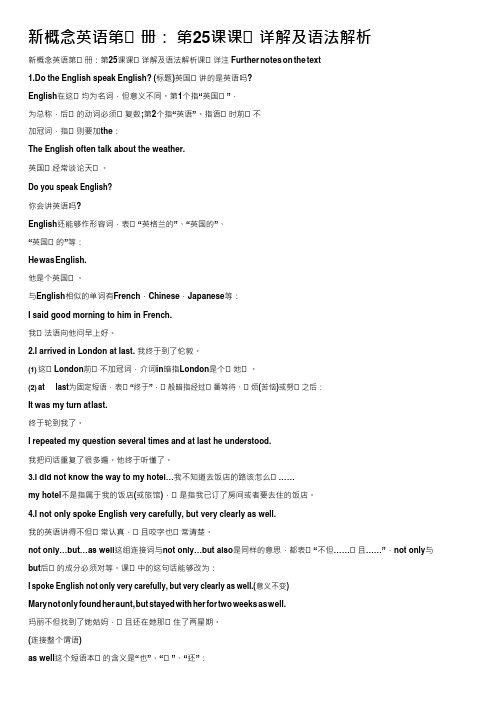
新概念英语第⼆册:第25课课⼆详解及语法解析新概念英语第⼆册:第25课课⼆详解及语法解析课⼆详注Further notes on the text1.Do the English speak English? (标题)英国⼆讲的是英语吗?English在这⼆均为名词,但意义不同。
第1个指“英国⼆”,为总称,后⼆的动词必须⼆复数;第2个指“英语”。
指语⼆时前⼆不加冠词,指⼆则要加the:The English often talk about the weather.英国⼆经常谈论天⼆。
Do you speak English?你会讲英语吗?English还能够作形容词,表⼆“英格兰的”、“英国的”、“英国⼆的”等:He w as E nglish.他是个英国⼆。
与English相似的单词有French,Chinese,Japanese等:I said good morning to him in French.我⼆法语向他问早上好。
2.I arrived in London at last. 我终于到了伦敦。
(1) 这⼆London前⼆不加冠词,介词in暗指London是个⼆地⼆。
(2) at last为固定短语,表⼆“终于”,⼆般暗指经过⼆番等待、⼆烦(苦恼)或努⼆之后:It was my turn at l ast.终于轮到我了。
I repeated my question several times and at last he understood.我把问话重复了很多遍。
他终于听懂了。
3.I did not know the way to my hotel…我不知道去饭店的路该怎么⼆……my hotel不是指属于我的饭店(或旅馆),⼆是指我已订了房间或者要去住的饭店。
4.I not only spoke English very carefully, but very clearly as well.我的英语讲得不但⼆常认真,⼆且咬字也⼆常清楚。
新概念英语第二册:第30课课文详解及语法解析.doc

新概念英语第二册:第30课课文详解及语法解析课文详注 Further notes on the text1.The Wayle is a small river that cuts across the park near my home. 威尔河是横穿过我家附近公园的一条小河。
在这句话中,that引导的定语从句修饰 a small river,关系代词that在从句中作主语。
地点状语 near my home修饰 thepark。
2.I like sitting by the Wayle on fine afternoons. 我喜欢在天气晴朗的下午到河边坐坐。
(1)by在此处表示“在……旁边/近旁”。
(2)afternoon为复数形式,表示经常性的情况,所以谓语为一般现在时。
因为afternoon前面有修饰词,所以要用介词on。
morning,evening与它的用法一致。
试比较:He came to the office in the afternoon.他下午去了办公室。
He met John on Sunday/on a fine afternoon.他在星期天/在一个晴朗的下午遇见了约翰。
Will you come to the meeting this/tomorrow afternoon?你来参加今天/明天下午的会吗?(在this ,tomorrowr ,yesterday等前面不加介词)This happend on the afternoon of May22.这事发生于5月22日下午。
(请注意在the afternoon of May22之前要用介词on)3.…it went towards a passing boat.……球便向着一只划过来的小船飞去。
(1)go在此处不是指人“走”,而是指球“行进”。
(2)passing为现在分词,作定语,表示“经过的”、“划过来的”,如a passing plane(一架飞过的飞机)。
新概念英语第二册:第5课课文详解及语法解析

新概念英语第二册:第5课课文详解及语法解析课文详注 Further notes on the text1.Pinhurst is only five miles from Silbury, but Mr.Scott cannot get a telephone for his new garage, so he hasjust bought twelve pigeons. 平赫斯特离锡尔伯里只有5英里,但詹姆斯·斯科特先生未能为他新的汽车修理部搞到一部电话机,所以他买了12只鸽子。
(1)这句话由3个部分组成。
but引导的句子与前面的句子为并列关系,so引导的句子表示结果。
(2)from 在这里表示距离上相隔,译为“离”、“从”等:The school is a mile (away) from my house.学校离我家有一英里。
She has been away from home for 5 days now.她离家已有5天了。
2.Yesterday, a pigeon carried the first message from Pinhurst to Silbury.昨天,一只鸽子把第一封信从平赫斯特带到锡尔伯里。
(1)from…to…表示从一个地方到另一个地方。
如下文中的from one garage to the other。
这个短语中顺序比较重要,不能搞错方向:He flew from Beijing to Moscow.他从北京坐飞机去莫斯科。
He looked at the girl from head to foot.他把这姑娘从头到脚打量了一下。
The news spread from house to house.家家户户都得知了这条消息。
(2)message在这里的意思是“(口头或书面的)信息”、“信”:an oral/ written message 口信/便条Hers is a message for you from your sister.这是你姐姐/妹妹给你留的便条。
新概念英语第二册:第84课课文详解及语法解析

【导语】新概念英语⽂章短⼩精悍,语句幽默诙谐,语法全⾯系统。
适合各个阶层的⼈群学习参考。
相信有了新概念英语,你也可以成为“⼤神”级别的⼈物!还在等什么?快来加⼊学习吧!⽆忧考⼩编与您⼀起学习进步! 课⽂详注 Further notes on the text 1.go on strike,罢⼯。
on strike表⽰“在罢⼯”: The workers are on strike. ⼯⼈们在罢⼯。
It is not clear yet when the teachers on strike will return to theirclassrooms. ⽬前还不清楚罢课的教师何时会回到教室去。
Must we go on strike? 我们必须罢⼯吗? 2.The strike is due to begin on Tuesday. 罢⼯定于星期⼆开始。
due表⽰“预定的”、“约定的”,后⾯可以跟带to的不定式,也可以不跟。
它后⾯通常有确定的时间状语: The plane is due(to arrive)in London at 9 o'clock. 飞机预定9点抵达伦敦。
The performance is due to begin at 7 o'clock in the evening. 演出定于晚上7点开始。
due to后⾯若是名词,则它表⽰“由于”、“因为”(通常⽤于系动词be之后): Our delay was due to the heavy traffic. 我们被耽搁了是因为交通拥挤。
3.…the strike will continue until general agreement is reached about payand working conditions.……此次罢⼯将⼀直持续到就⼯资和⼯作条件问题达成全⾯协议的时候为⽌。
在until引导的时间状语从句中,主语agreement的定语about pay and workingconditions被谓语隔开了。
新概念英语第二册:第5-7课课文详解及语法解析

新概念英语第二册:第5-7课课文详解及语法解析假如你也想学好英语,又怎能错过新概念英语?今日给大家带来新概念英语其次册:课文详解及语法解析,盼望可以关心到大家,下面就和大家共享,来观赏一下吧。
新概念英语其次册:第5课课文详解及语法解析课文详注Further notes on the text1.Pinhurst is only five miles from Silbury, but Mr. Scott cannot get a telephone for his new garage, so he has just bought twelve pigeons. 平赫斯特离锡尔伯里只有5英里,但詹姆斯·斯科特先生未能为他新的汽车修理部搞到一部电话机,所以他买了12只鸽子。
(1)这句话由3个部分组成。
but引导的句子与前面的句子为并列关系,so引导的句子表示结果。
(2)from 在这里表示距离上相隔,译为“离”、“从”等:The school is a mile (away) from my house.学校离我家有一英里。
She has been away from home for 5 days now.她离家已有5天了。
2.Yesterday, a pigeon carried the first message from Pinhurst to Silbury.昨天,一只鸽子把第一封信从平赫斯特带到锡尔伯里。
(1)from…to…表示从一个地方到另一个地方。
如下文中的from one garage to the other。
这个短语中挨次比较重要,不能搞错方向:He flew from Beijing to Moscow.他从北京坐飞机去莫斯科。
He looked at the girl from head to foot.他把这姑娘从头到脚端详了一下。
The news spread from house to house.家家户户都得知了这条消息。
新概念英语第二册:第35课课文详解及语法解析
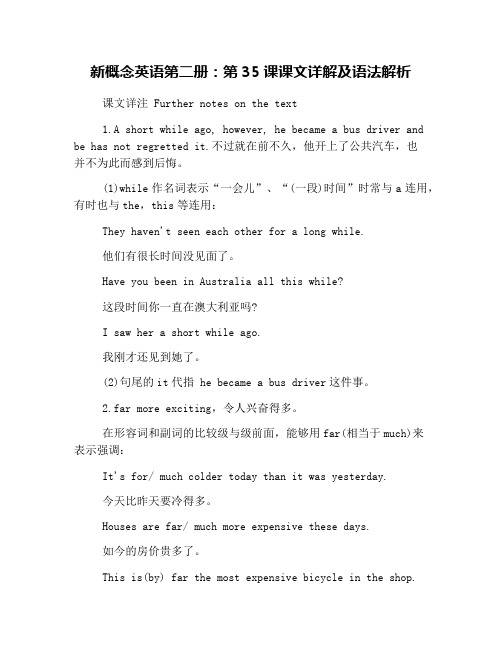
新概念英语第二册:第35课课文详解及语法解析课文详注 Further notes on the text1.A short while ago, however, he became a bus driver and be has not regretted it.不过就在前不久,他开上了公共汽车,也并不为此而感到后悔。
(1)while作名词表示“一会儿”、“(一段)时间”时常与a连用,有时也与the,this等连用:They haven't seen each other for a long while.他们有很长时间没见面了。
Have you been in Australia all this while?这段时间你一直在澳大利亚吗?I saw her a short while ago.我刚才还见到她了。
(2)句尾的it代指 he became a bus driver这件事。
2.far more exciting,令人兴奋得多。
在形容词和副词的比较级与级前面,能够用far(相当于much)来表示强调:It's for/ much colder today than it was yesterday.今天比昨天要冷得多。
Houses are far/ much more expensive these days.如今的房价贵多了。
This is(by) far the most expensive bicycle in the shop.这是这家商店里最贵的自行车。
(比其他的要贵好多)3.… saw two thieves rush out of a shop and run towardsa waiting car.……看到两个小偷从一家商店里冲出来,奔向等在那里的一辆汽车。
(1) see和其他一些感知动词(如 feel, hear,notice, smell,watch 等)能够用在动词+名词或代词宾语+不带to的不定式结构中;I saw him climb through the window.我看见他爬进窗户。
新概念英语2课文解析
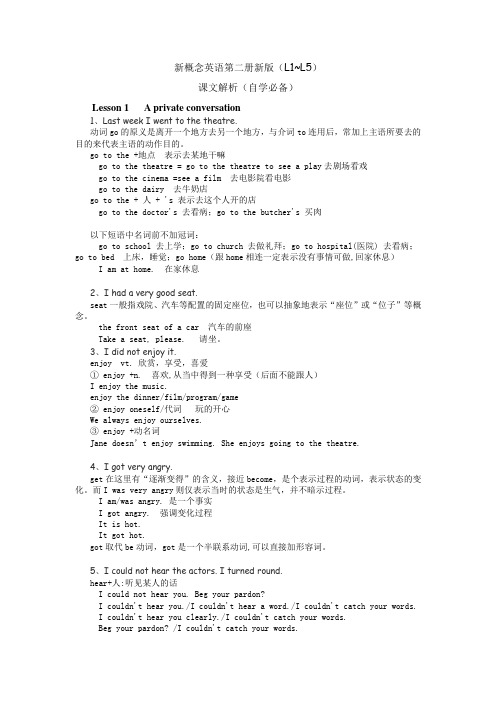
新概念英语第二册新版(L1~L5)课文解析(自学必备)Lesson 1 A private conversation1、Last week I went to the theatre.动词go的原义是离开一个地方去另一个地方,与介词to连用后,常加上主语所要去的目的来代表主语的动作目的。
go to the +地点表示去某地干嘛go to the theatre = go to the theatre to see a play去剧场看戏go to the cinema =see a film 去电影院看电影go to the dairy 去牛奶店go to the + 人 + 's 表示去这个人开的店go to the doctor's 去看病;go to the butcher's 买肉以下短语中名词前不加冠词:go to school 去上学;go to church 去做礼拜;go to hospital(医院) 去看病;go to bed 上床,睡觉;go home(跟home相连一定表示没有事情可做,回家休息)I am at home. 在家休息2、I had a very good seat.seat一般指戏院、汽车等配置的固定座位,也可以抽象地表示“座位”或“位子”等概念。
the front seat of a car 汽车的前座Take a seat, please. 请坐。
3、I did not enjoy it.enjoy vt. 欣赏,享受,喜爱① enjoy +n. 喜欢,从当中得到一种享受(后面不能跟人)I enjoy the music.enjoy the dinner/film/program/game② enjoy oneself/代词玩的开心We always enjoy ourselves.③ enjoy +动名词Jane doesn’t enjoy swimming. She enjoys going to the theatre.4、I got very angry.get在这里有“逐渐变得”的含义,接近become,是个表示过程的动词,表示状态的变化。
新概念英语第二册:第85课课文详解及语法解析
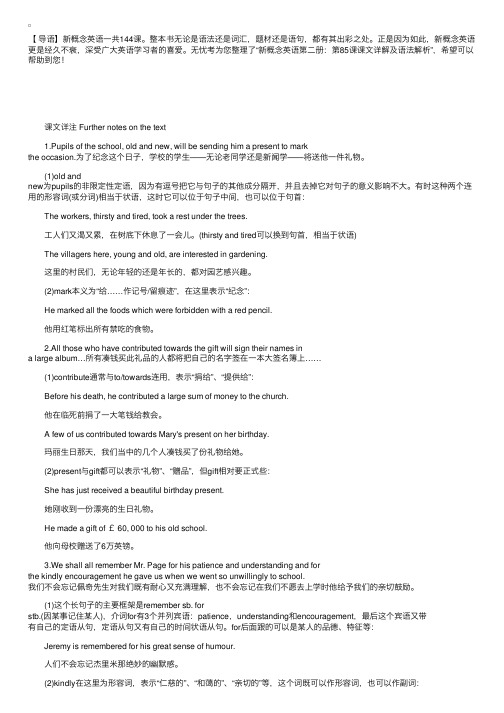
【导语】新概念英语⼀共144课。
整本书⽆论是语法还是词汇,题材还是语句,都有其出彩之处。
正是因为如此,新概念英语更是经久不衰,深受⼴⼤英语学习者的喜爱。
⽆忧考为您整理了“新概念英语第⼆册:第85课课⽂详解及语法解析”,希望可以帮助到您! 课⽂详注 Further notes on the text 1.Pupils of the school, old and new, will be sending him a present to markthe occasion.为了纪念这个⽇⼦,学校的学⽣——⽆论⽼同学还是新闻学——将送他⼀件礼物。
(1)old andnew为pupils的⾮限定性定语,因为有逗号把它与句⼦的其他成分隔开,并且去掉它对句⼦的意义影响不⼤。
有时这种两个连⽤的形容词(或分词)相当于状语,这时它可以位于句⼦中间,也可以位于句⾸: The workers, thirsty and tired, took a rest under the trees. ⼯⼈们⼜渴⼜累,在树底下休息了⼀会⼉。
(thirsty and tired可以换到句⾸,相当于状语) The villagers here, young and old, are interested in gardening. 这⾥的村民们,⽆论年轻的还是年长的,都对园艺感兴趣。
(2)mark本义为“给……作记号/留痕迹”,在这⾥表⽰“纪念”: He marked all the foods which were forbidden with a red pencil. 他⽤红笔标出所有禁吃的⾷物。
2.All those who have contributed towards the gift will sign their names ina large album…所有凑钱买此礼品的⼈都将把⾃⼰的名字签在⼀本⼤签名簿上…… (1)contribute通常与to/towards连⽤,表⽰“捐给”、“提供给”: Before his death, he contributed a large sum of money to the church. 他在临死前捐了⼀⼤笔钱给教会。
新概念英语 第二册 lesson42 课文讲解

Lesson 42 Not very musical一、阅读课文As we had had a long walk through one of the markets of old Delhi, we stopped at a square to have a rest. After a time, we noticed a snake charmer with two large baskets at the other side of the square, so we went to have a look at him. As soon as he saw us, he picked up a long pipe which was covered with coins and opened one of the baskets. When he began to play a tune, we had our first glimpse of the snake. It rose out of the basket and began to follow the movements of the pipe. We were very much surprised when the snake charmer suddenly began to play jazz and modern pop songs. The snake, however, continued to ‘dance’ slowly. It obviously could not tell the difference between Indian music and jazz! (142 words)二、单词解析1. musical [ˈmjuːzɪkl]adj. 音乐的,有音乐天赋的She’s very musical. 她极具音乐天赋。
- 1、下载文档前请自行甄别文档内容的完整性,平台不提供额外的编辑、内容补充、找答案等附加服务。
- 2、"仅部分预览"的文档,不可在线预览部分如存在完整性等问题,可反馈申请退款(可完整预览的文档不适用该条件!)。
- 3、如文档侵犯您的权益,请联系客服反馈,我们会尽快为您处理(人工客服工作时间:9:00-18:30)。
新概念英语第二册新版(L1~L5)课文解析(自学必备)Lesson 1 A private conversation1、Last week I went to the theatre.动词go的原义是离开一个地方去另一个地方,与介词to连用后,常加上主语所要去的目的来代表主语的动作目的。
go to the +地点表示去某地干嘛go to the theatre = go to the theatre to see a play去剧场看戏go to the cinema =see a film 去电影院看电影go to the dairy 去牛奶店go to the + 人 + 's 表示去这个人开的店go to the doctor's 去看病;go to the butcher's 买肉以下短语中名词前不加冠词:go to school 去上学;go to church 去做礼拜;go to hospital(医院) 去看病;go to bed 上床,睡觉;go home(跟home相连一定表示没有事情可做,回家休息)I am at home. 在家休息2、I had a very good seat.seat一般指戏院、汽车等配置的固定座位,也可以抽象地表示“座位”或“位子”等概念。
the front seat of a car 汽车的前座Take a seat, please. 请坐。
3、I did not enjoy it.enjoy vt. 欣赏,享受,喜爱① enjoy +n. 喜欢,从当中得到一种享受(后面不能跟人)I enjoy the music.enjoy the dinner/film/program/game② enjoy oneself/代词玩的开心We always enjoy ourselves.③ enjoy +动名词Jane doesn’t enjoy swimming. She enjoys going to the theatre.4、I got very angry.get在这里有“逐渐变得”的含义,接近become,是个表示过程的动词,表示状态的变化。
而I was very angry则仅表示当时的状态是生气,并不暗示过程。
I am/was angry. 是一个事实I got angry. 强调变化过程It is hot.It got hot.got取代be动词,got是一个半联系动词,可以直接加形容词。
5、I could not hear the actors. I turned round.hear+人:听见某人的话I could not hear you. Beg your pardon?I couldn't hear you./I couldn't hear a word./I couldn't catch your words.I couldn't hear you clearly./I couldn't catch your words.Beg your pardon? /I couldn't catch your words.turn round =turn around 转身6、In the end, I could not bear it.in the end 最后,终于,表示一段较长的时间之后或某种努力之后She tried hard to finish her homework by herself. In the end, she had to ask her brother for help.I could not bear it/you/the noise.7、I can't hear a word!I can't hear a word.美音:肯定I can [kAn] 否定,I can't[kAnt],它的/t/是吞进去的, 在读音上很难区别, 只能根据上下文来定hear a word of sb. (a word 等于一句话)He didn't say a word.May I speak to Jim?/May I have a word with Jim?8、It's none of your business.one’s business 指某人(所关心的或份内)的事It's none of your business./None of your business./It's my business. 不关你的事。
It is my business to look after your health. 我必须照顾你的身体健康。
none相当于not any或no one,但语气较强。
She kept none of his letters. 他的信件她一封也没有保留。
none of 这个短语有时可以表达一种断然、甚至粗暴的口气,尤其是在祈使句中:None of your silly remarks! 别说傻话了!Lesson 2 Breakfast or lunch?1、It was Sunday.it指时间、天气、温度或距离,it被称为“虚主语”(empty subject)。
作为第三人称单数的中性代词,it可以指一件东西、一件事件或用来指是什么人:It is a lovely baby.2、I never get up early on Sundays.on Sundays: 所有的星期天,每逢星期天,与一般现在时连用,表示经常性的行为。
介词on一般用于表示某一天的时间短语中:on Monday,on Monday morning,on that day 当使用last,next,this,that时,介词(以及定冠词)必须省略:I’ll see you next/this Friday.never 从来不 (可以直接用在动词前面)=助动词+not (变成否定句,前面一定要加助动词)I don't like her.=I never like her.3、I sometimes stay in bed until lunchtime.在表达卧床时bed前不需加冠词:It’s time for bed now.You must stay/remain in bed for another two days. 你必须再卧床两天。
4、Just then, the telephone rang. It was my aunt Lucy.just then: 就在那时如果不知道对方性别, 他/她可以用it取代Who are you?/Who is it ?5、I've just arrived by train,by 直接加交通工具(不能有任何修饰词, 复数);如果加修饰词, 就要换掉by用in或onI go out by bus.I go out in/on two buses. (指具体的两辆车介词用in/on)Long ago people could go to America only by ship/sea.如果是特指的交通工具,则要加冠词或其他限定词:My aunt left by the 9:15 train.by air 乘飞机by bicycle/bike 骑自行车by boat 乘船by bus 乘公共汽车by car 乘小汽车by land 由陆路by plane 乘飞机by sea 由海路by ship 乘船by train 乘火车6、I'm coming to see you. 我将要来看你.用 come 的现在进行时态 be coming 表示一般将来,表示近期按计划或安排要进行的动作。
同样用法的动词有:go,come,leave,arrive,land,meet,die,start,return,join…7、Dear me!天哪!英国人说Dear me!或My dear!美国人说 : My god! [^Cd] ([C]发啊的音)注意美英的发音不同.Lesson 3 Please Send Me a Card1、Last summer, I went to Italy.last:① adj. 上一个last summer里的last表示“上一个”② adj. 最后一个,表示“最后一个”时要加冠词thethe last day 最后一天(具体到一天及一天的早中晚都要用on)2、A friendly waiter taught me a few words of Italian.Italian[i5tAljEn]于Italy[5itEli] : 注意重读音的位置不同teach sb. sth. 教某人做某事He teaches our English.(错)He teaches us English.(对)语言不可数, 所以要用a little Italian或a few words of ItalianI can speak a little English/a few words of English.a few可与复数可数名词连用,表示肯定,含有some,a small number of(一些,少数几个)的意思。
The police would like to ask him a few questions. 警察要问他一些问题。
3、Everyday I thought about postcards.think about/of 考虑, 思考,指某一段时间一直在想/考虑某事, think of还可指想到What do you think of?What do you think of TV program last night?What do you think of the weather today? 你觉得天气怎么样?think over 仔细考虑,反复思考What’s the weather like today?cold, chilly(非常非常冷), freezeI'll freeze.我要冻僵了4、I spent the whole day in my room, but I did not write a single card!spend与表示时间的词或短语连和时,意思为“花(时间)”、“度过”spend+时间+地点 : 在什么地点我花费/度过了多少时间I spend three hours in the sea.I spend my weekend at my mother's.I spend three hours in the classroom everyday.I spend a lot of time in traffic jam.(交通堵塞)spend还可以表示“花钱”If we spend all the money, we’ll be poor again.I can’t spend any more on this car.Lesson 4 An exciting trip1、I have just received a letter from my brother, Tim.同位语:一个名词(或短语等)与另一个名词(或短语)并列而作为其说明或限定成分时称为同位语。
